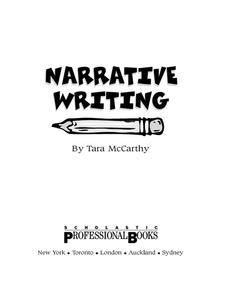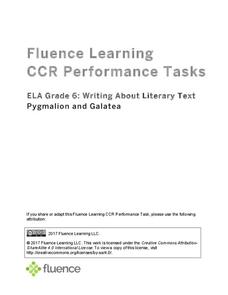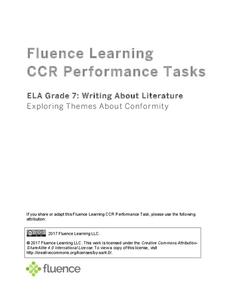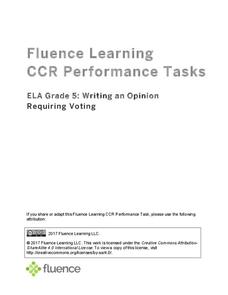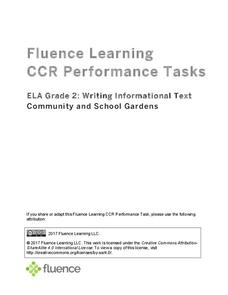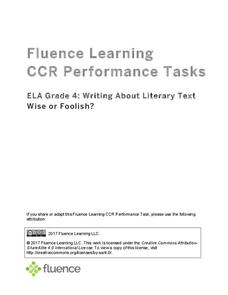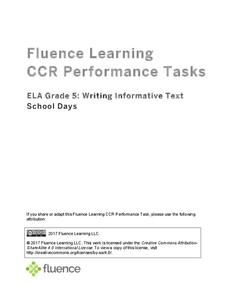Great Books Foundation
Rattlesnakes
John Muir may be a friend to the natural world, but as a short reading passage confirms, he is no friend to rattlesnakes. As young readers learn about Muir's encounters with the dangerous creatures, they answer four comprehension...
PBS
A Time and Place: The Importance of Setting in To Kill a Mockingbird
A strong community acts as a family during difficult times. The evidence for the family aspects of Maycomb is abundant in Harper Lee's To Kill a Mockingbird, and it is the focus of a lesson on the importance of setting as it relates to a...
ReadWriteThink
Word Recognition Strategies Using Nursery Rhymes
As a class, scholars read the poems, Humpty Dumpty, Peter, Peter, Pumpkin Eater, and Jack and Jill, in order to identify words with the same ending sound. Using their rhyming skills, learners brainstorm additional words from word...
Novelinks
The Devil’s Arithmetic: QAR Strategy
Asking questions about the text is an important way for kids to become critical readers. Use a QAR activity based on The Devil's Arithmetic to help learners decipher between questions that are right there, between the author and the...
Novelinks
The Little Prince: Biopoem Strategy
Learn about character traits with a biopoem activity. Based on Antoine de Saint-Exupéry's The Little Prince, the activity prompts learners to fill in the blanks of a poem form to describe themselves.
Institute for Humane Education
Selling "Boy" and "Girl"
Monster trucks, action figures, and video games. Are these toys designed for boys or girls? Scholars work in small groups to find and categorize examples of boy and girl toys from catalogs. Next, learners analyze the two sets of pictures...
Curated OER
Designing a Crew Exploration Vehicle
Take your class on an out-of-this-world adventure with this fun engineering design activity. Working in small groups, young scientists design, build, and test crew exploration vehicles using some creativity, teamwork, and an assortment...
Evan-Moor
Daily Handwriting Practice: Traditional Cursive
Keep your class practicing handwriting each day in a 36-week school year with this comprehensive resource that combines daily cursive practice with content such as poetry, geography facts, continents, and much more.
E Reading Worksheets
Summarizing Text
Help learners find the most important information in a text with a lesson on summarizing. As kids read through a passage about Johannes Gutenberg, they summarize small excerpts, put events in sequential order, and respond to two longer...
Scholastic
Narrative Writing
If you're looking to start a unit based around narrative writing, make sure to consider this resource while you're planning. This book covers five topics: writing personal narratives, writing narratives about others, writing narratives...
Mary Pope Osborne, Classroom Adventures Program
Dinosaurs Before Dark
Young readers travel back to the time of the dinosaurs in this literature unit based on the story Dinosaurs Before Dark. Intended for use with upper-elementary special education students, this resource provides reading comprehension,...
Scholastic
Teaching with Aesop's Fables
Bring the applicable morals of Aesop's Fables to your classroom with a series of reading comprehension activities. With 12 different fables with activities and exercises, the packet focuses on the ways learners can apply the fables and...
K12 Reader
Choose the Correct Homophone
It's a known secret that English can be a difficult language to learn, and homophones don't make it any easier. Help your young readers tackle these tricky words with this simple fill-in-the blank exercise in which they identify the word...
Fluence Learning
Writing a Narrative: How Bear Lost His Tail
After reading the first, second, and third parts of "How Bear Lost His Tail", third grade writers answer questions about the story by completing a series of options, including discussion points. Then, they begin to plan a new narrative...
Fluence Learning
Writing About Literary Text: Pygmalion and Galatea
Is it crazy to fall in love with your own work, or is that the purest love of all? Compare two renditions of the classic Greek myth Pygmalion and Galatea with a literary analysis exercise. After students compare the similarities and...
Fluence Learning
Writing About Literature: Exploring Themes About Conformity
Feeling the pressure to confirm is something any adolescent can relate to. Explore an essential theme with a response to literature assessment that prompts learners to identify main ideas with evidence and supporting details.
Fluence Learning
Writing About Informational Text: Beyond the Beyond—Galaxies
Everyone has a different point of view, even when it comes to the enormity of the universe. Two separate text passages explain the scope of a galaxy, prompting young readers to write an essay about each author's argument and how the...
Fluence Learning
Writing an Opinion Requiring Voting
Challenge writers to compose an essay detailing their stance on, and the history of, voting. Three assignments, each broken down into three parts, requires fifth graders to take notes, read and complete charts, write paragraphs, compare...
Fluence Learning
Writing Informational Text: Community and School Gardens
Two informational texts feature community gardens of the past and present and how seeds grow. Scholars read, discuss what they have read, complete a timeline, define words, and compose a brief essay about the texts' main idea.
Fluence Learning
Writing About Informational Text: Everybody Can Bike
A three-part assessment challenges scholars to read informational texts in order to complete three tasks. Following a brief reading, class members take part in grand conversations, complete charts, and work in small groups to research...
Fluence Learning
Writing About Literary Text: Wise or Foolish?
A three-part assessment promotes reading comprehension skills. Class members read literary texts and take notes to discuss their findings, answer comprehension questions, write summaries, and complete charts.
Fluence Learning
Writing an Opinion: Student Council
A three-part assessment challenges scholars to write opinion essays covering the topic of the student council. After reading three passages, writers complete a chart, work with peers to complete a mini-research project, answer...
Fluence Learning
Writing About Literature: Comparing and Contrasting Characters in Heidi
Scholars read excerpts from the story, Heidi, in a three-part assessment that focuses on comparing and contrasting characters. Each part contains three tasks that challenge learners to discuss, answer comprehension questions,...
Fluence Learning
Writing Informative Text: School Days
A three-part writing assessment challenges scholars to think critically about schools of the past and present. Learners read informative texts, answer questions to prepare for a discussion, research in small groups, complete a Venn...
Other popular searches
- English Language Arts Exam
- English Language Arts Games
- Deaf English Language Arts
- English Language Arts Music
- English Language Arts Heroes
- English Language Arts Skills
- Language Arts English
- English Language Arts Grade 3
- English Language Arts Poetry
- English Language Arts Rating=3
- English Language Arts Unit Sc
- Language Arts or English











